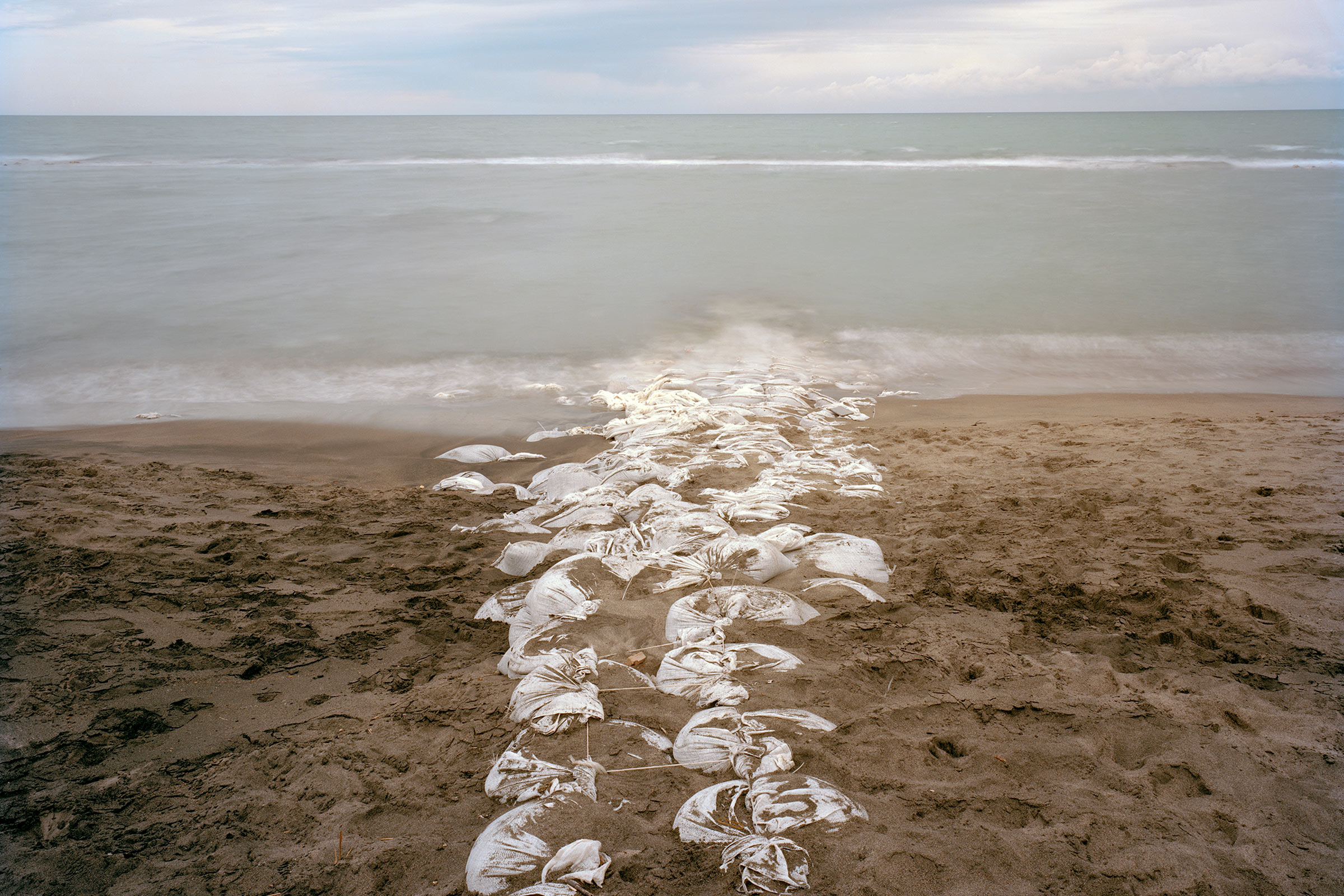
Massimo Mastrorillo
White Murder
Location: Palazzo Guinigi, Via Guinigi, 29
Opening days and hours:
Monday – Thursday from 15:00 to 19:00
Friday – Sunday from 10:00 to 19:00
White is the afternoon light, and the fog on the soccer field on which the white legs of us boys were growing. And the factory, further on, white and pale, marking the limit of a future we would discover impossible. The days of work and dignity would come, when personal self-determination would go hand in hand with the progress of people, a nation, a continent. The days when we would pay the price of biblical retribution, of supreme punishment for our hubris. But between quarrels over a foul, as the ball rolled over the embankment, we did not yet know the psalms of this liturgy. In that industrial plant, a few metres away from our youth, the dreams of a country that has always confused synonyms and antonyms were being forged and, at the same time, ending. Later we would have wondered, embarrassed by the banality of our question, to what extent work coincided with duty; the duty to be punctual, to get up, every morning, to break the spinal column of calendars, the duty of a yes sir that makes will numb, for the sole purpose of eating and drinking, sleeping and childbearing, putting a roof over our heads for our basic needs. This would have been our doctrine. The dignity of living, but also, as if all this were not the minimum compromise for a never-ending slavery, taking the risk of a death that crushes our life, on a sunny weekday morning, just as we were struggling to have one. White Murder strips the places of the tragedy, entirely Italian, that still is work, returning them to the passive surrounding environmental spaces. Leveraging the extra-text, it keeps the asphyxiating specters of ravenous profit, of now systemic negligence, of the anesthesia that makes the public forget the distortions of a sprawling and reckless production machine away from those places. A series of postcards hinting at the disaster that was, fearing the disaster that will come. Witnesses are the trees and the beaches, the streams and the rocks; nature, in its imperturbability, broadens the view and facilitates the awareness of what, without fear of contradiction, is Italy’s greatest failure, the most overwhelming proof of the peninsular inability to be human. While elsewhere, from Sweden to Japan, solutions are being worked out to improve workers’ welfare, to work less, to work better. Here certain topics are still treated as heretical, esoteric speculation. The world is full of accidents and the dead have no nationality. But the eighty workers who leave home to work and die every month in Italy say, in a sadly muted voice, that not all accidents can be ascribed to the dense and uncontrolled plots of chance. They point to the conniving semantic disorder that confuses the right to safety at work with an absurd and extravagant luxury, or worse, an excess of zeal. Work makes you free: this statement, with a vaguely Orwellian flavor, does not protect those women and men who have unjustly fallen asleep in the shadow of such a grand, deceitful promise. What remains are the headlines, the numbers fattening the statistics, our bovine assertiveness. Only If we are able to reorganise our vocabularies will work and dignity be synonyms again. For now, as if those boys we once were sensed the assassin dressed in white occupying the entire factory in the background, we will no longer set foot on that improvised soccer field. We will remember, to the point of tears, the calluses on our fathers’ hands, and reflect on our own, and we will stop carrying the coffin of our future on our shoulders.
by Vincenzo Montisano
BIOGRAPHY
Born in Turin, Massimo Mastrorillo studied at the University of Perugia and graduated in photography at the European Institute of Design in Rome, where he currently lives. In 2015, he founded Door, a factory for the conception, design and dissemination of visual culture and photography in particular. Over the years, Door has had the opportunity to collaborate with authors of the calibre of Ricardo Cases, Antonio Xoubanova, Aleix Plademunt, Federico Clavarino, Max Pinckers, Niccolò De Giorgis, Martin Kollar, Rafal Milach, Bertien Van Manen, Anouk Kruitof, Oscar Monzon, David Campany, Sophie Ristelhueber, Adam Broomberg, Julian Germain, Vanessa Winship, and Joan Fontcuberta. In 2017-18 Door originated LIBRO, the first master’s degree on the Photographic Book in Italy, in which ten authors, including photographers and graphic designers (J Carrier, Ricardo Cases, Jason Fulford, Eloi Gimeno, Hans Gremmen, Jeffrey Ladd, Massimo Mastrorillo, Ed Panar, Gregoire Pujade-Lauraine, Antonio Xoubanova) taught and interacted with students through workshops, talks and tutoring. Also with Door and in collaboration with the Materia gallery, Mastrorillo devised the international talent call LATENT, which involves the selection of an author for a residency and the production of a project on the city of Rome. The call received an average of almost 200 submissions per edition. Mastrorillo was Leica Ambassador for about three years.


